Analyzing the Impacts of Tourism: An Economic & Environmental Review
VerifiedAdded on 2023/06/17
|9
|2262
|284
Essay
AI Summary
This essay provides a comprehensive analysis of the tourism industry, focusing on its development and the significant factors influencing its growth. It delves into the positive and negative economic impacts, such as job creation and increased revenue versus seasonal employment and rising costs. Furthermore, the essay examines the environmental impacts, highlighting both conservation efforts and increased pollution, alongside the socio-cultural effects, including preservation of heritage and the potential for cultural disruption. The study concludes by emphasizing the importance of sustainable practices and responsible tourism management to mitigate negative impacts and maximize the benefits of tourism for economies, environments, and societies.
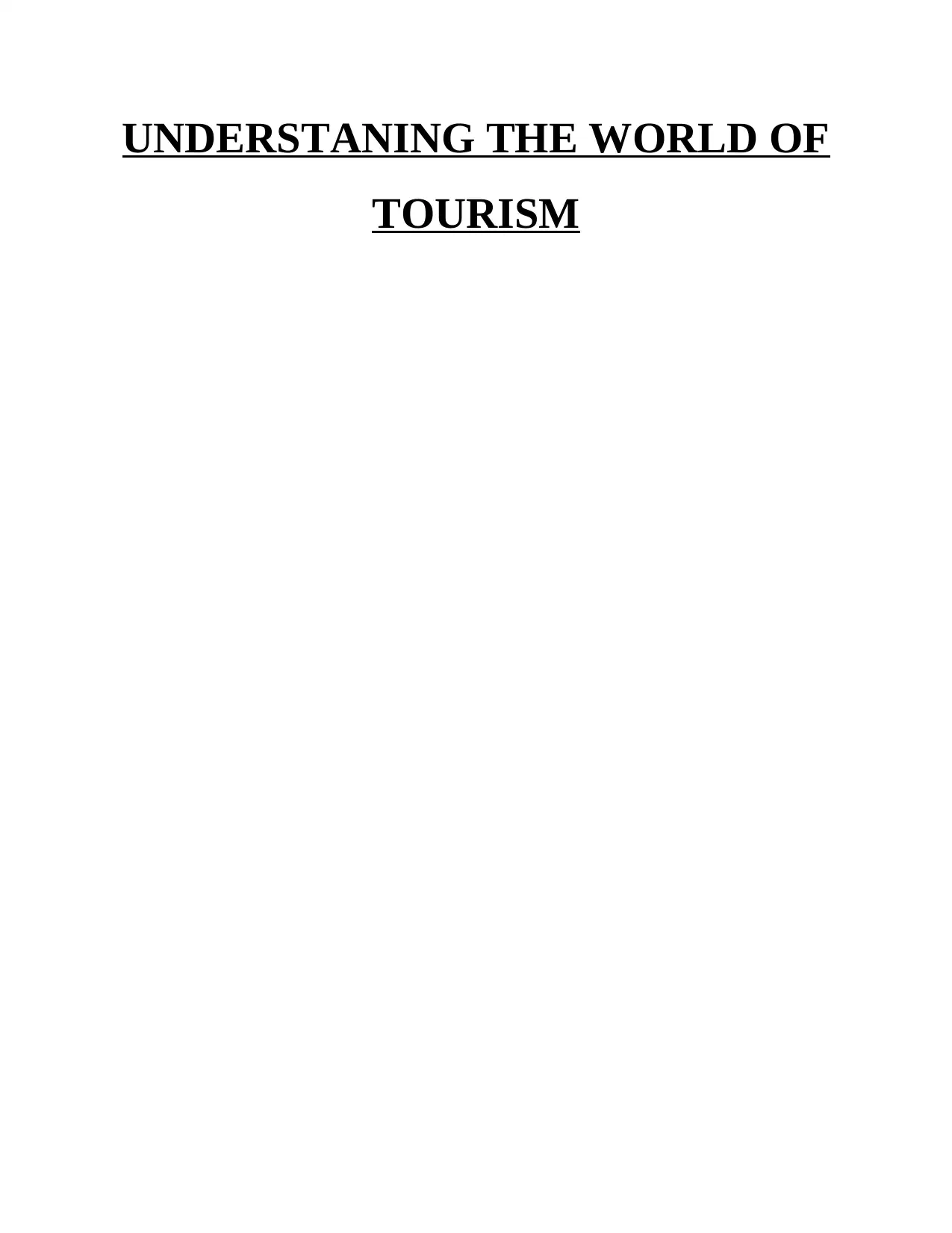
UNDERSTANING THE WORLD OF
TOURISM
TOURISM
Paraphrase This Document
Need a fresh take? Get an instant paraphrase of this document with our AI Paraphraser
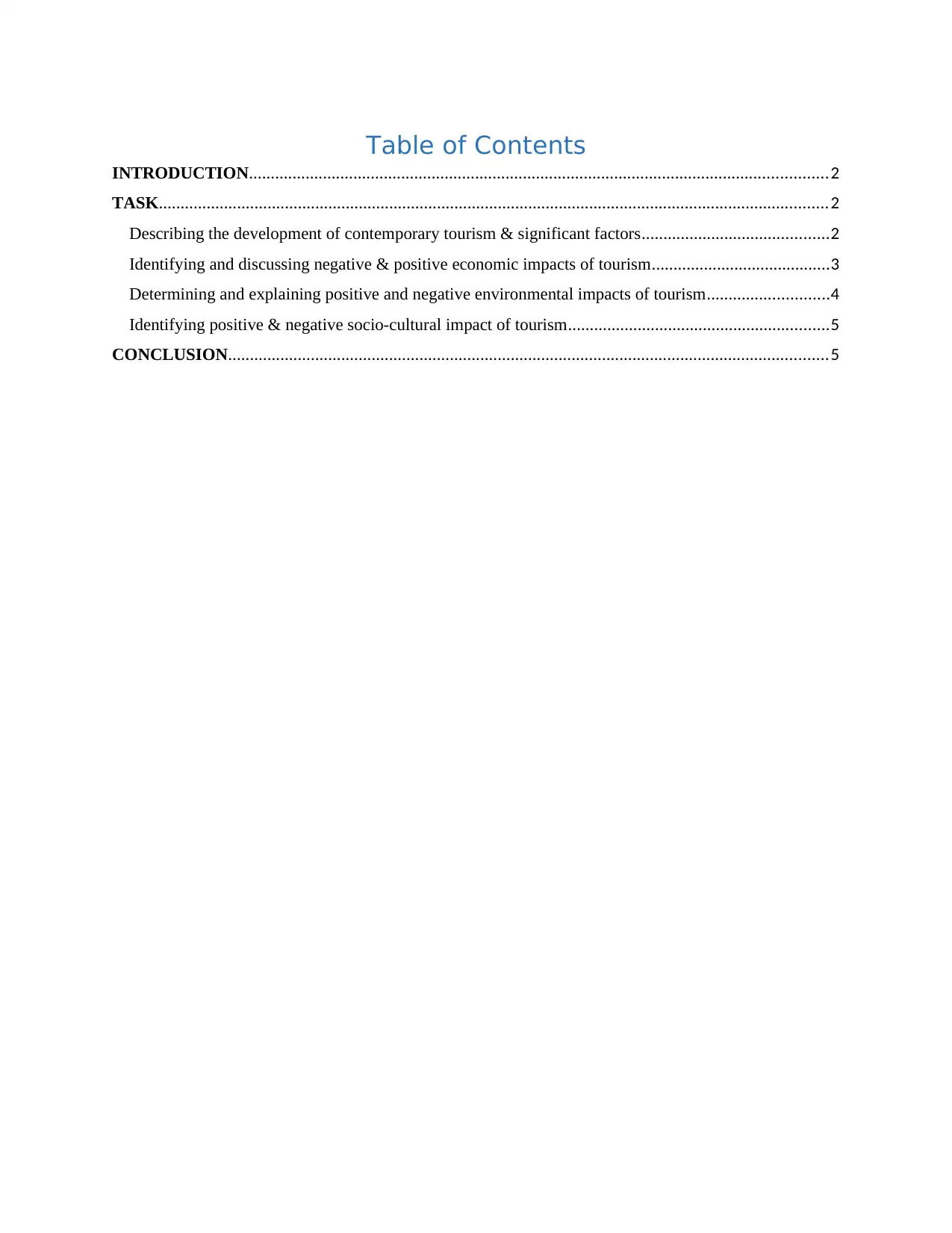
Table of Contents
INTRODUCTION.....................................................................................................................................2
TASK..........................................................................................................................................................2
Describing the development of contemporary tourism & significant factors...........................................2
Identifying and discussing negative & positive economic impacts of tourism.........................................3
Determining and explaining positive and negative environmental impacts of tourism............................4
Identifying positive & negative socio-cultural impact of tourism............................................................5
CONCLUSION..........................................................................................................................................5
INTRODUCTION.....................................................................................................................................2
TASK..........................................................................................................................................................2
Describing the development of contemporary tourism & significant factors...........................................2
Identifying and discussing negative & positive economic impacts of tourism.........................................3
Determining and explaining positive and negative environmental impacts of tourism............................4
Identifying positive & negative socio-cultural impact of tourism............................................................5
CONCLUSION..........................................................................................................................................5
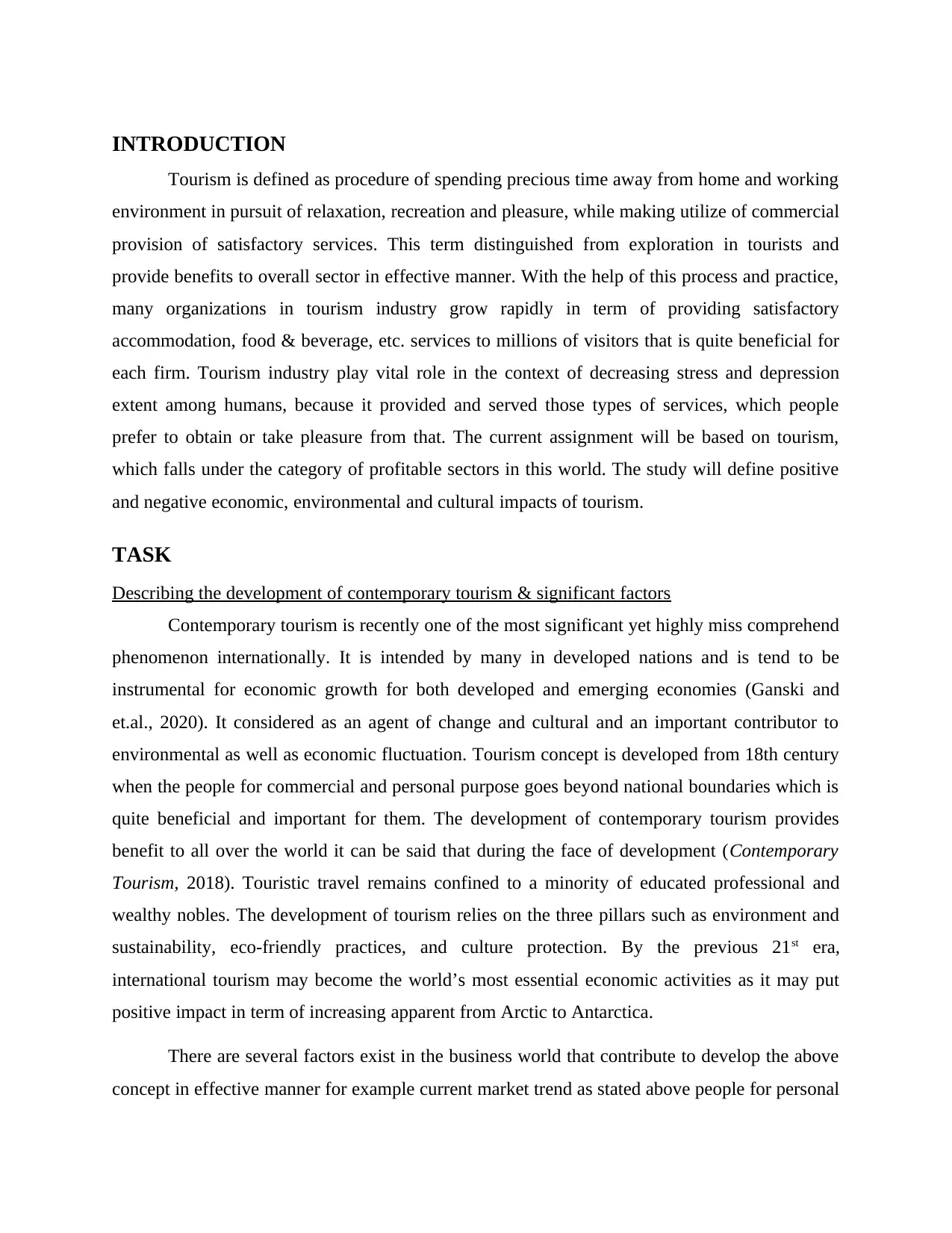
INTRODUCTION
Tourism is defined as procedure of spending precious time away from home and working
environment in pursuit of relaxation, recreation and pleasure, while making utilize of commercial
provision of satisfactory services. This term distinguished from exploration in tourists and
provide benefits to overall sector in effective manner. With the help of this process and practice,
many organizations in tourism industry grow rapidly in term of providing satisfactory
accommodation, food & beverage, etc. services to millions of visitors that is quite beneficial for
each firm. Tourism industry play vital role in the context of decreasing stress and depression
extent among humans, because it provided and served those types of services, which people
prefer to obtain or take pleasure from that. The current assignment will be based on tourism,
which falls under the category of profitable sectors in this world. The study will define positive
and negative economic, environmental and cultural impacts of tourism.
TASK
Describing the development of contemporary tourism & significant factors
Contemporary tourism is recently one of the most significant yet highly miss comprehend
phenomenon internationally. It is intended by many in developed nations and is tend to be
instrumental for economic growth for both developed and emerging economies (Ganski and
et.al., 2020). It considered as an agent of change and cultural and an important contributor to
environmental as well as economic fluctuation. Tourism concept is developed from 18th century
when the people for commercial and personal purpose goes beyond national boundaries which is
quite beneficial and important for them. The development of contemporary tourism provides
benefit to all over the world it can be said that during the face of development (Contemporary
Tourism, 2018). Touristic travel remains confined to a minority of educated professional and
wealthy nobles. The development of tourism relies on the three pillars such as environment and
sustainability, eco-friendly practices, and culture protection. By the previous 21st era,
international tourism may become the world’s most essential economic activities as it may put
positive impact in term of increasing apparent from Arctic to Antarctica.
There are several factors exist in the business world that contribute to develop the above
concept in effective manner for example current market trend as stated above people for personal
Tourism is defined as procedure of spending precious time away from home and working
environment in pursuit of relaxation, recreation and pleasure, while making utilize of commercial
provision of satisfactory services. This term distinguished from exploration in tourists and
provide benefits to overall sector in effective manner. With the help of this process and practice,
many organizations in tourism industry grow rapidly in term of providing satisfactory
accommodation, food & beverage, etc. services to millions of visitors that is quite beneficial for
each firm. Tourism industry play vital role in the context of decreasing stress and depression
extent among humans, because it provided and served those types of services, which people
prefer to obtain or take pleasure from that. The current assignment will be based on tourism,
which falls under the category of profitable sectors in this world. The study will define positive
and negative economic, environmental and cultural impacts of tourism.
TASK
Describing the development of contemporary tourism & significant factors
Contemporary tourism is recently one of the most significant yet highly miss comprehend
phenomenon internationally. It is intended by many in developed nations and is tend to be
instrumental for economic growth for both developed and emerging economies (Ganski and
et.al., 2020). It considered as an agent of change and cultural and an important contributor to
environmental as well as economic fluctuation. Tourism concept is developed from 18th century
when the people for commercial and personal purpose goes beyond national boundaries which is
quite beneficial and important for them. The development of contemporary tourism provides
benefit to all over the world it can be said that during the face of development (Contemporary
Tourism, 2018). Touristic travel remains confined to a minority of educated professional and
wealthy nobles. The development of tourism relies on the three pillars such as environment and
sustainability, eco-friendly practices, and culture protection. By the previous 21st era,
international tourism may become the world’s most essential economic activities as it may put
positive impact in term of increasing apparent from Arctic to Antarctica.
There are several factors exist in the business world that contribute to develop the above
concept in effective manner for example current market trend as stated above people for personal
⊘ This is a preview!⊘
Do you want full access?
Subscribe today to unlock all pages.

Trusted by 1+ million students worldwide
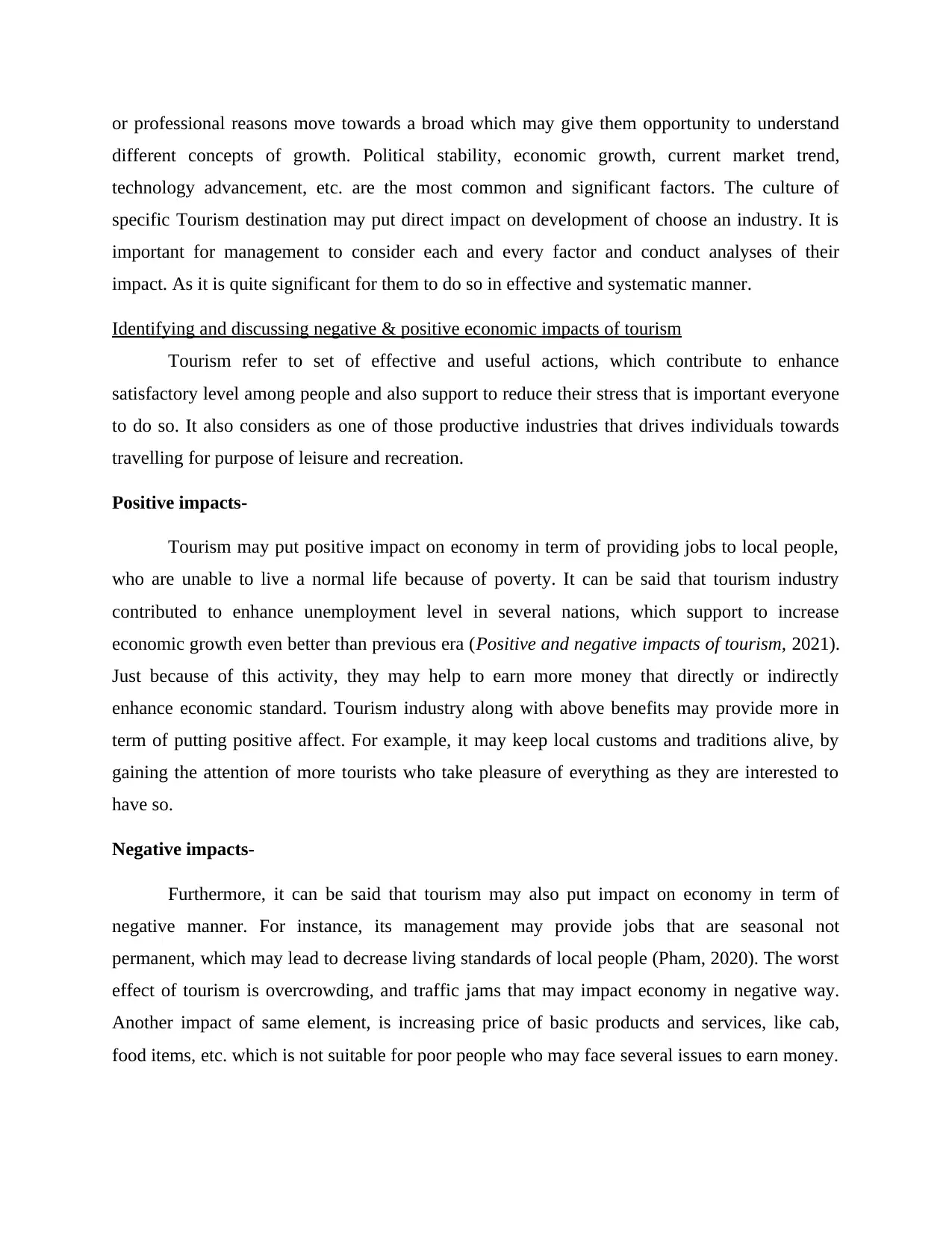
or professional reasons move towards a broad which may give them opportunity to understand
different concepts of growth. Political stability, economic growth, current market trend,
technology advancement, etc. are the most common and significant factors. The culture of
specific Tourism destination may put direct impact on development of choose an industry. It is
important for management to consider each and every factor and conduct analyses of their
impact. As it is quite significant for them to do so in effective and systematic manner.
Identifying and discussing negative & positive economic impacts of tourism
Tourism refer to set of effective and useful actions, which contribute to enhance
satisfactory level among people and also support to reduce their stress that is important everyone
to do so. It also considers as one of those productive industries that drives individuals towards
travelling for purpose of leisure and recreation.
Positive impacts-
Tourism may put positive impact on economy in term of providing jobs to local people,
who are unable to live a normal life because of poverty. It can be said that tourism industry
contributed to enhance unemployment level in several nations, which support to increase
economic growth even better than previous era (Positive and negative impacts of tourism, 2021).
Just because of this activity, they may help to earn more money that directly or indirectly
enhance economic standard. Tourism industry along with above benefits may provide more in
term of putting positive affect. For example, it may keep local customs and traditions alive, by
gaining the attention of more tourists who take pleasure of everything as they are interested to
have so.
Negative impacts-
Furthermore, it can be said that tourism may also put impact on economy in term of
negative manner. For instance, its management may provide jobs that are seasonal not
permanent, which may lead to decrease living standards of local people (Pham, 2020). The worst
effect of tourism is overcrowding, and traffic jams that may impact economy in negative way.
Another impact of same element, is increasing price of basic products and services, like cab,
food items, etc. which is not suitable for poor people who may face several issues to earn money.
different concepts of growth. Political stability, economic growth, current market trend,
technology advancement, etc. are the most common and significant factors. The culture of
specific Tourism destination may put direct impact on development of choose an industry. It is
important for management to consider each and every factor and conduct analyses of their
impact. As it is quite significant for them to do so in effective and systematic manner.
Identifying and discussing negative & positive economic impacts of tourism
Tourism refer to set of effective and useful actions, which contribute to enhance
satisfactory level among people and also support to reduce their stress that is important everyone
to do so. It also considers as one of those productive industries that drives individuals towards
travelling for purpose of leisure and recreation.
Positive impacts-
Tourism may put positive impact on economy in term of providing jobs to local people,
who are unable to live a normal life because of poverty. It can be said that tourism industry
contributed to enhance unemployment level in several nations, which support to increase
economic growth even better than previous era (Positive and negative impacts of tourism, 2021).
Just because of this activity, they may help to earn more money that directly or indirectly
enhance economic standard. Tourism industry along with above benefits may provide more in
term of putting positive affect. For example, it may keep local customs and traditions alive, by
gaining the attention of more tourists who take pleasure of everything as they are interested to
have so.
Negative impacts-
Furthermore, it can be said that tourism may also put impact on economy in term of
negative manner. For instance, its management may provide jobs that are seasonal not
permanent, which may lead to decrease living standards of local people (Pham, 2020). The worst
effect of tourism is overcrowding, and traffic jams that may impact economy in negative way.
Another impact of same element, is increasing price of basic products and services, like cab,
food items, etc. which is not suitable for poor people who may face several issues to earn money.
Paraphrase This Document
Need a fresh take? Get an instant paraphrase of this document with our AI Paraphraser
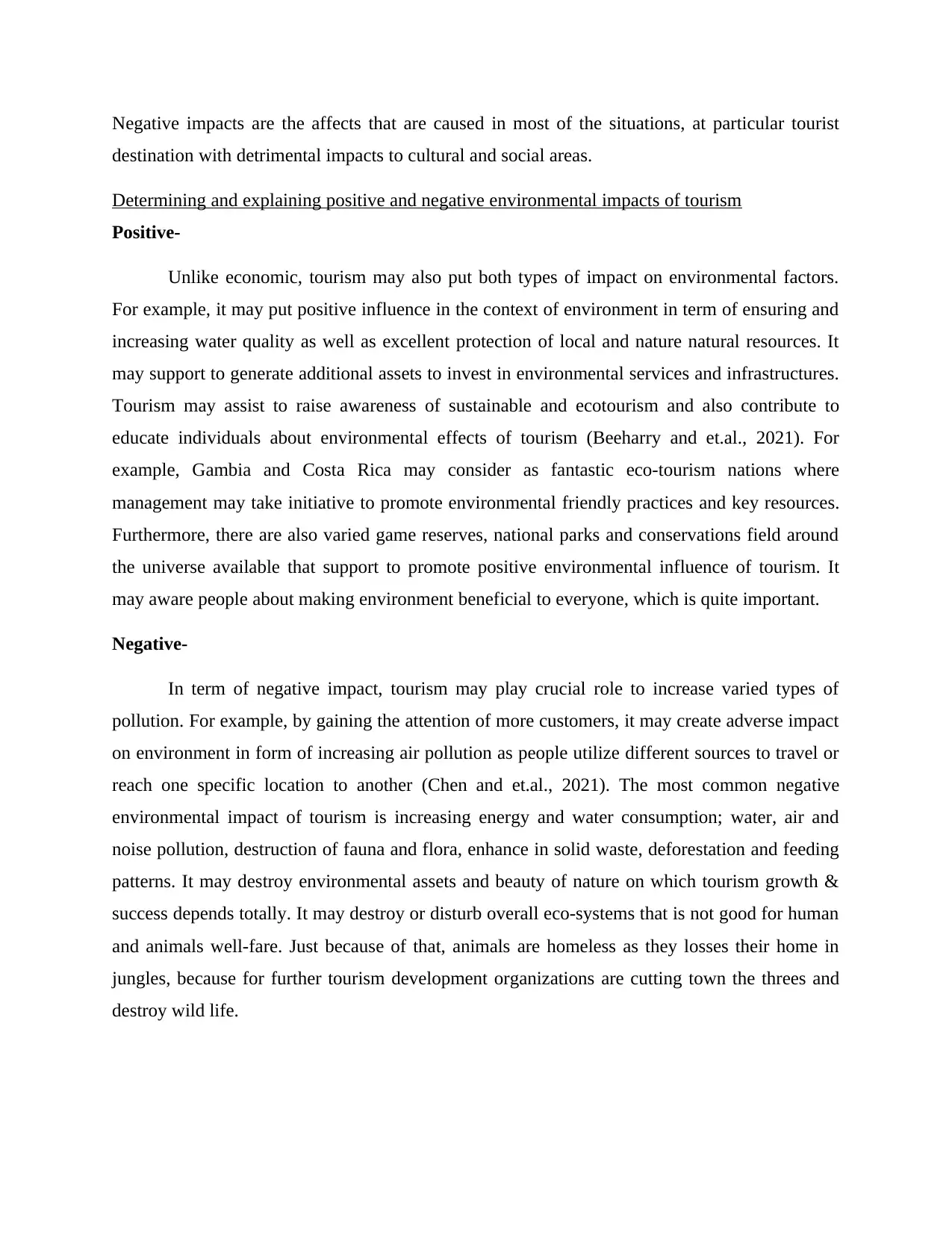
Negative impacts are the affects that are caused in most of the situations, at particular tourist
destination with detrimental impacts to cultural and social areas.
Determining and explaining positive and negative environmental impacts of tourism
Positive-
Unlike economic, tourism may also put both types of impact on environmental factors.
For example, it may put positive influence in the context of environment in term of ensuring and
increasing water quality as well as excellent protection of local and nature natural resources. It
may support to generate additional assets to invest in environmental services and infrastructures.
Tourism may assist to raise awareness of sustainable and ecotourism and also contribute to
educate individuals about environmental effects of tourism (Beeharry and et.al., 2021). For
example, Gambia and Costa Rica may consider as fantastic eco-tourism nations where
management may take initiative to promote environmental friendly practices and key resources.
Furthermore, there are also varied game reserves, national parks and conservations field around
the universe available that support to promote positive environmental influence of tourism. It
may aware people about making environment beneficial to everyone, which is quite important.
Negative-
In term of negative impact, tourism may play crucial role to increase varied types of
pollution. For example, by gaining the attention of more customers, it may create adverse impact
on environment in form of increasing air pollution as people utilize different sources to travel or
reach one specific location to another (Chen and et.al., 2021). The most common negative
environmental impact of tourism is increasing energy and water consumption; water, air and
noise pollution, destruction of fauna and flora, enhance in solid waste, deforestation and feeding
patterns. It may destroy environmental assets and beauty of nature on which tourism growth &
success depends totally. It may destroy or disturb overall eco-systems that is not good for human
and animals well-fare. Just because of that, animals are homeless as they losses their home in
jungles, because for further tourism development organizations are cutting town the threes and
destroy wild life.
destination with detrimental impacts to cultural and social areas.
Determining and explaining positive and negative environmental impacts of tourism
Positive-
Unlike economic, tourism may also put both types of impact on environmental factors.
For example, it may put positive influence in the context of environment in term of ensuring and
increasing water quality as well as excellent protection of local and nature natural resources. It
may support to generate additional assets to invest in environmental services and infrastructures.
Tourism may assist to raise awareness of sustainable and ecotourism and also contribute to
educate individuals about environmental effects of tourism (Beeharry and et.al., 2021). For
example, Gambia and Costa Rica may consider as fantastic eco-tourism nations where
management may take initiative to promote environmental friendly practices and key resources.
Furthermore, there are also varied game reserves, national parks and conservations field around
the universe available that support to promote positive environmental influence of tourism. It
may aware people about making environment beneficial to everyone, which is quite important.
Negative-
In term of negative impact, tourism may play crucial role to increase varied types of
pollution. For example, by gaining the attention of more customers, it may create adverse impact
on environment in form of increasing air pollution as people utilize different sources to travel or
reach one specific location to another (Chen and et.al., 2021). The most common negative
environmental impact of tourism is increasing energy and water consumption; water, air and
noise pollution, destruction of fauna and flora, enhance in solid waste, deforestation and feeding
patterns. It may destroy environmental assets and beauty of nature on which tourism growth &
success depends totally. It may destroy or disturb overall eco-systems that is not good for human
and animals well-fare. Just because of that, animals are homeless as they losses their home in
jungles, because for further tourism development organizations are cutting town the threes and
destroy wild life.
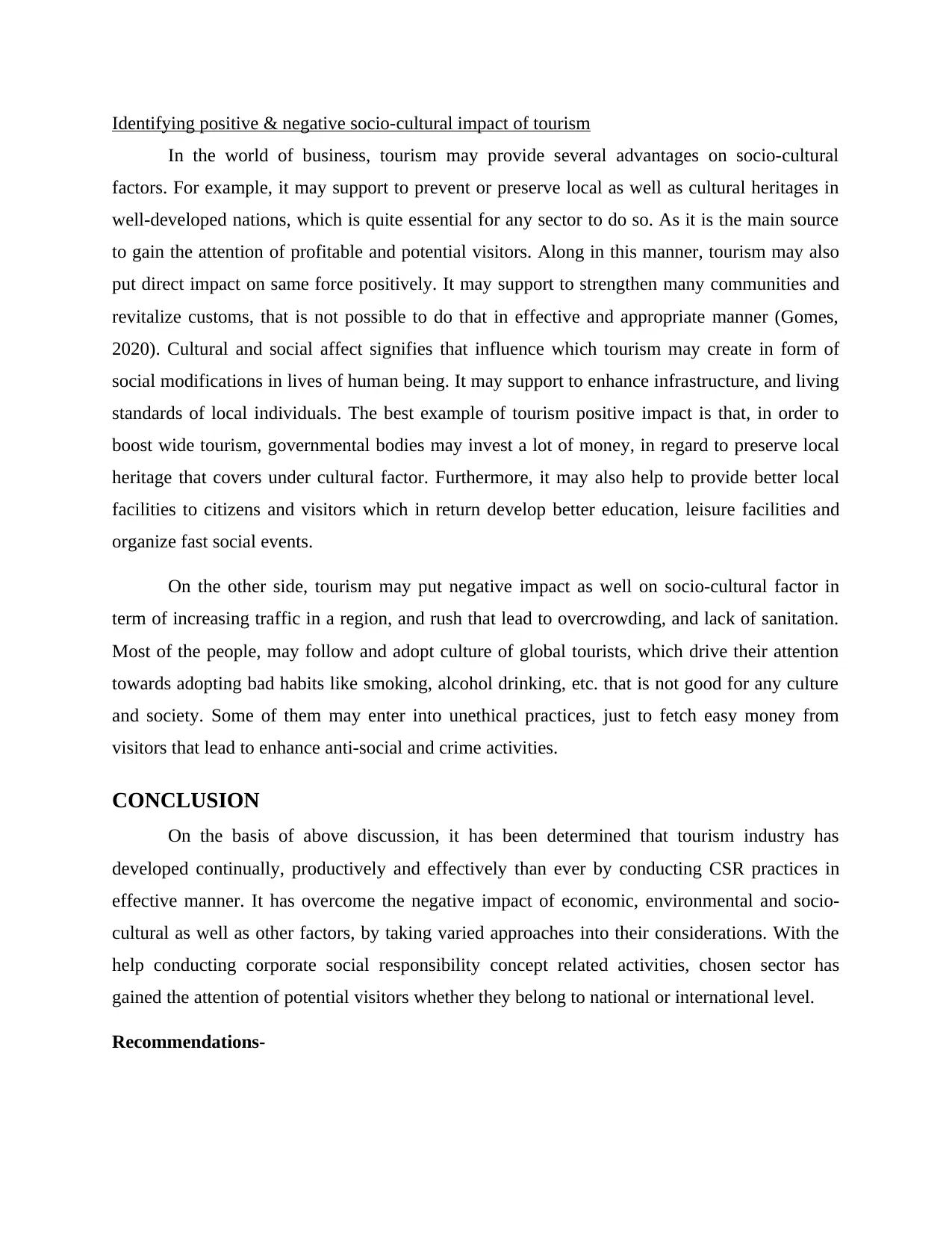
Identifying positive & negative socio-cultural impact of tourism
In the world of business, tourism may provide several advantages on socio-cultural
factors. For example, it may support to prevent or preserve local as well as cultural heritages in
well-developed nations, which is quite essential for any sector to do so. As it is the main source
to gain the attention of profitable and potential visitors. Along in this manner, tourism may also
put direct impact on same force positively. It may support to strengthen many communities and
revitalize customs, that is not possible to do that in effective and appropriate manner (Gomes,
2020). Cultural and social affect signifies that influence which tourism may create in form of
social modifications in lives of human being. It may support to enhance infrastructure, and living
standards of local individuals. The best example of tourism positive impact is that, in order to
boost wide tourism, governmental bodies may invest a lot of money, in regard to preserve local
heritage that covers under cultural factor. Furthermore, it may also help to provide better local
facilities to citizens and visitors which in return develop better education, leisure facilities and
organize fast social events.
On the other side, tourism may put negative impact as well on socio-cultural factor in
term of increasing traffic in a region, and rush that lead to overcrowding, and lack of sanitation.
Most of the people, may follow and adopt culture of global tourists, which drive their attention
towards adopting bad habits like smoking, alcohol drinking, etc. that is not good for any culture
and society. Some of them may enter into unethical practices, just to fetch easy money from
visitors that lead to enhance anti-social and crime activities.
CONCLUSION
On the basis of above discussion, it has been determined that tourism industry has
developed continually, productively and effectively than ever by conducting CSR practices in
effective manner. It has overcome the negative impact of economic, environmental and socio-
cultural as well as other factors, by taking varied approaches into their considerations. With the
help conducting corporate social responsibility concept related activities, chosen sector has
gained the attention of potential visitors whether they belong to national or international level.
Recommendations-
In the world of business, tourism may provide several advantages on socio-cultural
factors. For example, it may support to prevent or preserve local as well as cultural heritages in
well-developed nations, which is quite essential for any sector to do so. As it is the main source
to gain the attention of profitable and potential visitors. Along in this manner, tourism may also
put direct impact on same force positively. It may support to strengthen many communities and
revitalize customs, that is not possible to do that in effective and appropriate manner (Gomes,
2020). Cultural and social affect signifies that influence which tourism may create in form of
social modifications in lives of human being. It may support to enhance infrastructure, and living
standards of local individuals. The best example of tourism positive impact is that, in order to
boost wide tourism, governmental bodies may invest a lot of money, in regard to preserve local
heritage that covers under cultural factor. Furthermore, it may also help to provide better local
facilities to citizens and visitors which in return develop better education, leisure facilities and
organize fast social events.
On the other side, tourism may put negative impact as well on socio-cultural factor in
term of increasing traffic in a region, and rush that lead to overcrowding, and lack of sanitation.
Most of the people, may follow and adopt culture of global tourists, which drive their attention
towards adopting bad habits like smoking, alcohol drinking, etc. that is not good for any culture
and society. Some of them may enter into unethical practices, just to fetch easy money from
visitors that lead to enhance anti-social and crime activities.
CONCLUSION
On the basis of above discussion, it has been determined that tourism industry has
developed continually, productively and effectively than ever by conducting CSR practices in
effective manner. It has overcome the negative impact of economic, environmental and socio-
cultural as well as other factors, by taking varied approaches into their considerations. With the
help conducting corporate social responsibility concept related activities, chosen sector has
gained the attention of potential visitors whether they belong to national or international level.
Recommendations-
⊘ This is a preview!⊘
Do you want full access?
Subscribe today to unlock all pages.

Trusted by 1+ million students worldwide
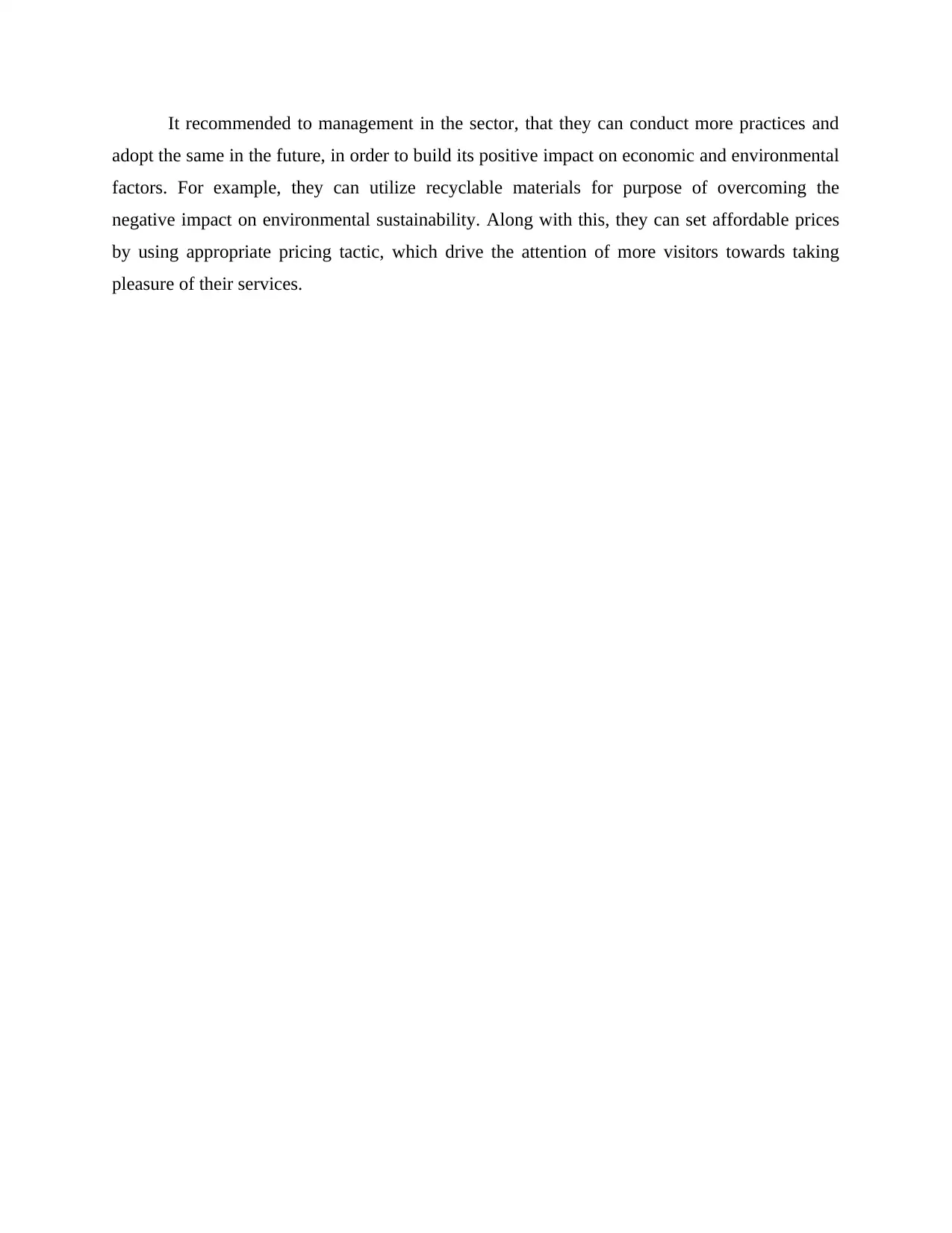
It recommended to management in the sector, that they can conduct more practices and
adopt the same in the future, in order to build its positive impact on economic and environmental
factors. For example, they can utilize recyclable materials for purpose of overcoming the
negative impact on environmental sustainability. Along with this, they can set affordable prices
by using appropriate pricing tactic, which drive the attention of more visitors towards taking
pleasure of their services.
adopt the same in the future, in order to build its positive impact on economic and environmental
factors. For example, they can utilize recyclable materials for purpose of overcoming the
negative impact on environmental sustainability. Along with this, they can set affordable prices
by using appropriate pricing tactic, which drive the attention of more visitors towards taking
pleasure of their services.
Paraphrase This Document
Need a fresh take? Get an instant paraphrase of this document with our AI Paraphraser
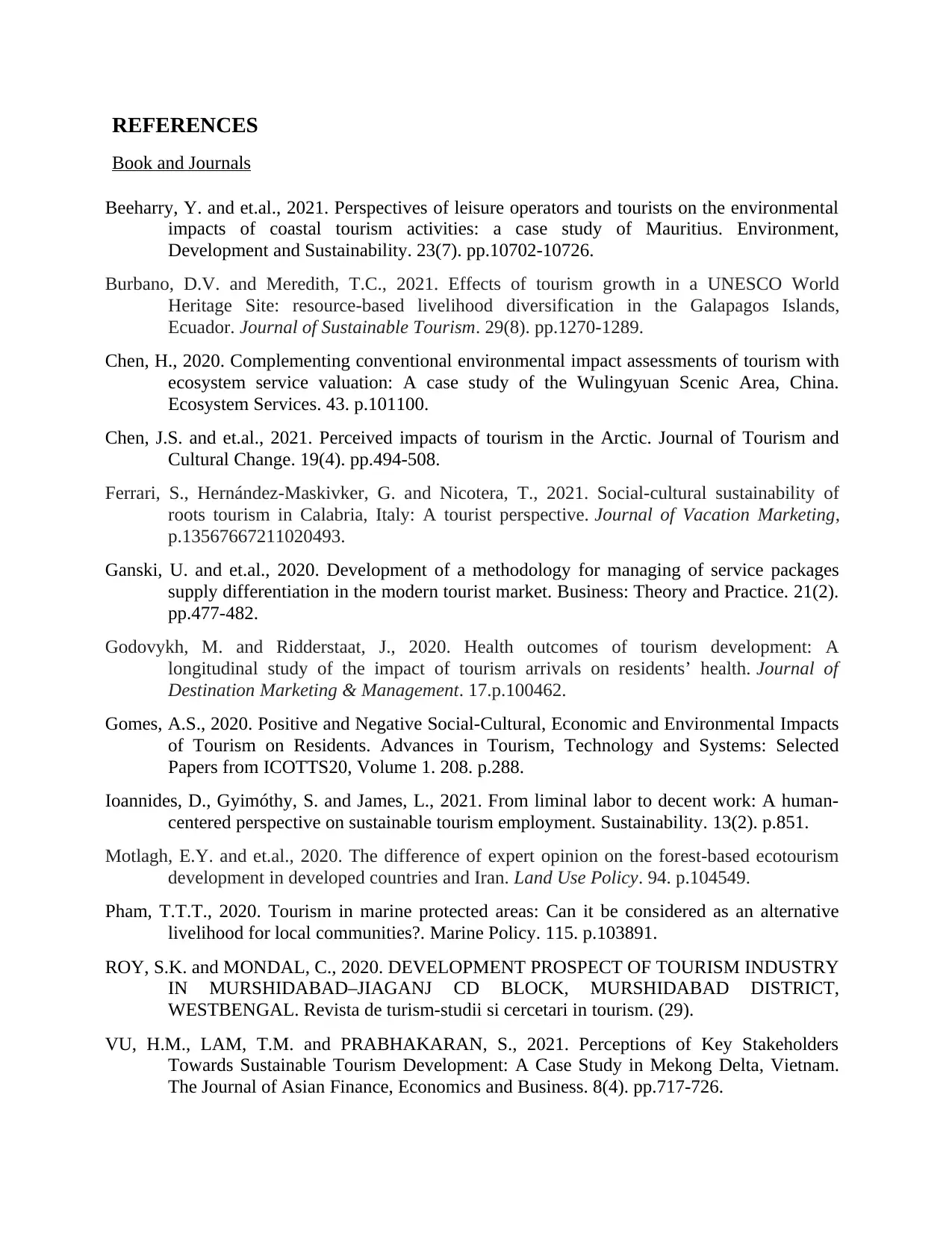
REFERENCES
Book and Journals
Beeharry, Y. and et.al., 2021. Perspectives of leisure operators and tourists on the environmental
impacts of coastal tourism activities: a case study of Mauritius. Environment,
Development and Sustainability. 23(7). pp.10702-10726.
Burbano, D.V. and Meredith, T.C., 2021. Effects of tourism growth in a UNESCO World
Heritage Site: resource-based livelihood diversification in the Galapagos Islands,
Ecuador. Journal of Sustainable Tourism. 29(8). pp.1270-1289.
Chen, H., 2020. Complementing conventional environmental impact assessments of tourism with
ecosystem service valuation: A case study of the Wulingyuan Scenic Area, China.
Ecosystem Services. 43. p.101100.
Chen, J.S. and et.al., 2021. Perceived impacts of tourism in the Arctic. Journal of Tourism and
Cultural Change. 19(4). pp.494-508.
Ferrari, S., Hernández-Maskivker, G. and Nicotera, T., 2021. Social-cultural sustainability of
roots tourism in Calabria, Italy: A tourist perspective. Journal of Vacation Marketing,
p.13567667211020493.
Ganski, U. and et.al., 2020. Development of a methodology for managing of service packages
supply differentiation in the modern tourist market. Business: Theory and Practice. 21(2).
pp.477-482.
Godovykh, M. and Ridderstaat, J., 2020. Health outcomes of tourism development: A
longitudinal study of the impact of tourism arrivals on residents’ health. Journal of
Destination Marketing & Management. 17.p.100462.
Gomes, A.S., 2020. Positive and Negative Social-Cultural, Economic and Environmental Impacts
of Tourism on Residents. Advances in Tourism, Technology and Systems: Selected
Papers from ICOTTS20, Volume 1. 208. p.288.
Ioannides, D., Gyimóthy, S. and James, L., 2021. From liminal labor to decent work: A human-
centered perspective on sustainable tourism employment. Sustainability. 13(2). p.851.
Motlagh, E.Y. and et.al., 2020. The difference of expert opinion on the forest-based ecotourism
development in developed countries and Iran. Land Use Policy. 94. p.104549.
Pham, T.T.T., 2020. Tourism in marine protected areas: Can it be considered as an alternative
livelihood for local communities?. Marine Policy. 115. p.103891.
ROY, S.K. and MONDAL, C., 2020. DEVELOPMENT PROSPECT OF TOURISM INDUSTRY
IN MURSHIDABAD–JIAGANJ CD BLOCK, MURSHIDABAD DISTRICT,
WESTBENGAL. Revista de turism-studii si cercetari in tourism. (29).
VU, H.M., LAM, T.M. and PRABHAKARAN, S., 2021. Perceptions of Key Stakeholders
Towards Sustainable Tourism Development: A Case Study in Mekong Delta, Vietnam.
The Journal of Asian Finance, Economics and Business. 8(4). pp.717-726.
Book and Journals
Beeharry, Y. and et.al., 2021. Perspectives of leisure operators and tourists on the environmental
impacts of coastal tourism activities: a case study of Mauritius. Environment,
Development and Sustainability. 23(7). pp.10702-10726.
Burbano, D.V. and Meredith, T.C., 2021. Effects of tourism growth in a UNESCO World
Heritage Site: resource-based livelihood diversification in the Galapagos Islands,
Ecuador. Journal of Sustainable Tourism. 29(8). pp.1270-1289.
Chen, H., 2020. Complementing conventional environmental impact assessments of tourism with
ecosystem service valuation: A case study of the Wulingyuan Scenic Area, China.
Ecosystem Services. 43. p.101100.
Chen, J.S. and et.al., 2021. Perceived impacts of tourism in the Arctic. Journal of Tourism and
Cultural Change. 19(4). pp.494-508.
Ferrari, S., Hernández-Maskivker, G. and Nicotera, T., 2021. Social-cultural sustainability of
roots tourism in Calabria, Italy: A tourist perspective. Journal of Vacation Marketing,
p.13567667211020493.
Ganski, U. and et.al., 2020. Development of a methodology for managing of service packages
supply differentiation in the modern tourist market. Business: Theory and Practice. 21(2).
pp.477-482.
Godovykh, M. and Ridderstaat, J., 2020. Health outcomes of tourism development: A
longitudinal study of the impact of tourism arrivals on residents’ health. Journal of
Destination Marketing & Management. 17.p.100462.
Gomes, A.S., 2020. Positive and Negative Social-Cultural, Economic and Environmental Impacts
of Tourism on Residents. Advances in Tourism, Technology and Systems: Selected
Papers from ICOTTS20, Volume 1. 208. p.288.
Ioannides, D., Gyimóthy, S. and James, L., 2021. From liminal labor to decent work: A human-
centered perspective on sustainable tourism employment. Sustainability. 13(2). p.851.
Motlagh, E.Y. and et.al., 2020. The difference of expert opinion on the forest-based ecotourism
development in developed countries and Iran. Land Use Policy. 94. p.104549.
Pham, T.T.T., 2020. Tourism in marine protected areas: Can it be considered as an alternative
livelihood for local communities?. Marine Policy. 115. p.103891.
ROY, S.K. and MONDAL, C., 2020. DEVELOPMENT PROSPECT OF TOURISM INDUSTRY
IN MURSHIDABAD–JIAGANJ CD BLOCK, MURSHIDABAD DISTRICT,
WESTBENGAL. Revista de turism-studii si cercetari in tourism. (29).
VU, H.M., LAM, T.M. and PRABHAKARAN, S., 2021. Perceptions of Key Stakeholders
Towards Sustainable Tourism Development: A Case Study in Mekong Delta, Vietnam.
The Journal of Asian Finance, Economics and Business. 8(4). pp.717-726.

Online
Contemporary Tourism. 2018. [Online]. Available Through: https://qs-gen.com/contemporary-
tourism-2/
Positive and negative impacts of tourism. 2021. [Online]. Available Through: <
https://www.bbc.co.uk/bitesize/guides/zqk7hyc/revision/3>
Contemporary Tourism. 2018. [Online]. Available Through: https://qs-gen.com/contemporary-
tourism-2/
Positive and negative impacts of tourism. 2021. [Online]. Available Through: <
https://www.bbc.co.uk/bitesize/guides/zqk7hyc/revision/3>
⊘ This is a preview!⊘
Do you want full access?
Subscribe today to unlock all pages.

Trusted by 1+ million students worldwide
1 out of 9
Related Documents
Your All-in-One AI-Powered Toolkit for Academic Success.
+13062052269
info@desklib.com
Available 24*7 on WhatsApp / Email
![[object Object]](/_next/static/media/star-bottom.7253800d.svg)
Unlock your academic potential
Copyright © 2020–2026 A2Z Services. All Rights Reserved. Developed and managed by ZUCOL.

